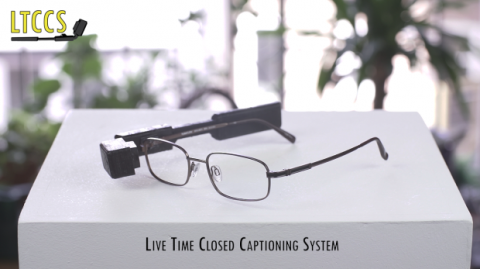LTCCS - speech to text converter
The Live-Time Closed Captioning System, or LTCCS, aims to change that dynamic. Designed by a team of five young entrepreneurs and currently seeking funding on Indiegogo, the wearable is meant to be non-intrusive to daily life, bringing control over communication back to the hard of hearing or deaf user.
Like a Google Glass of assistive technology, the LTCCS simply clips on to the user’s glasses frame. Its three parts work in unison to provide live closed captioning of conversations occurring in the range of the user’s microphone. The display, which is the primary wearable component, fits onto the user’s glasses and displays the closed-captioned conversation as it happens. A discreet microphone attached to an item of clothing picks up the conversation using voice-to-speech technology, then relays it a lightweight microcomputer, which can be carried in a pocket or purse. The microcomputer is solely dedicated to producing the captions, ensuring that the software runs smoothly and is able to keep up with the pace of conversation. This stands in contrast to assistive smartphone apps, which can be slowed down by other processes running on the device. If the person does not normally wear prescription glasses, the display can also be attached to an empty frame.
Creator Daniil Frants, who attends the Dwight School in New York City and won an award from the City for the LTCCS’s initial prototype, tells Digital Trends that he was inspired by Google Glass. “A lot of people were wondering if Google Glass could be used for something like this. And it turned out that Google Glass wasn’t really optimal for this, so I decided to make an alternative system which was dedicated to this function.”
The LTCCS is currently accepting donations on Indiegogo, and offers backer goals ranging from vinyl stickers to distributor packs.
KRISTINA DENSTITT

